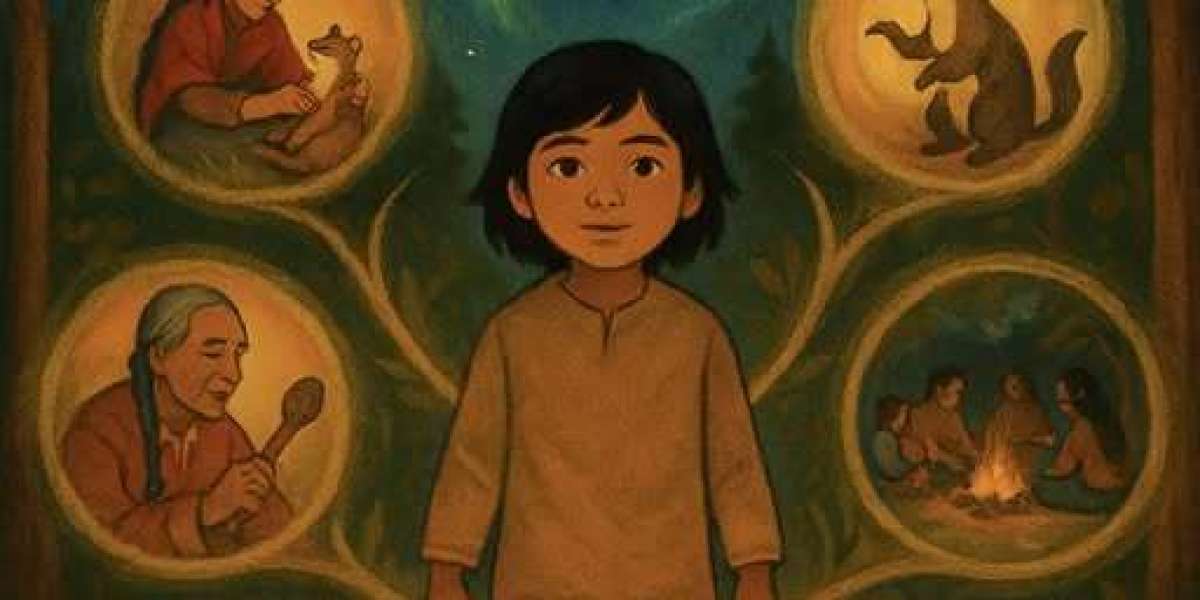Long ago, when the world was still young and the rivers had not yet forgotten their songs, there lived a young one named Kîwêtin. They were of the Pimicikamak people— born under the northern lights and raised by the rhythms of the drum and the whispers of the trees.
But something had changed in the land. The winds no longer smelled of berries. The fish did not leap as they once had. And the people — the people had begun to forget.
Kîwêtin wandered into the forest one morning, heavy with questions. “How do we find our way back?” they asked the birch trees. “How do we heal what has been broken?”
The old ones had told them: when you are lost, follow the roots.
1. Kisêwâtisiwin – Compassion
In the shadow of a cedar, Kîwêtin found a woman tending to a wounded fox. She did not ask what the fox had done or why it limped — only that it was in pain, and that pain needed kindness.
The woman turned and said, “Child, the first root is Compassion. Kisêwâtisiwin. Do not judge those who suffer. Meet them with open hands and a soft heart.”
2. Sâkihitowin – Love
Further along the trail, Kîwêtin came upon a young man sitting by the river, weeping into his hands. “I am ashamed,” he whispered. “I do not feel worthy.”
An Elder sat beside him, saying nothing at first, only drumming softly. Then she said, “Love yourself, even in your darkest hour. Sâkihitowin is not just romance or sweetness — it is choosing to care for your own spirit, even when it’s hard.”
3. Tâpwewin – Truth
The next root lay deep in the belly of a cave. Kîwêtin entered and found carvings on the wall — stories of loss, of sorrow, of betrayal. They were painful to look at, but they were real.
A voice echoed through the chamber: “Tâpwewin is the third root. Truth. Speak it, even when your voice shakes. Only truth can heal the poison of silence.”
4. Mâmawi-pimâtisiwin – Living Together
Emerging from the cave, Kîwêtin heard laughter. They followed it to a clearing where people were sharing food, dancing, telling stories by the fire. No one was alone.
A kokum beckoned them forward. “We heal in circles, not corners. Mâmawi-pimâtisiwin — we must live together. Isolation is the breeding ground of pain.”
5. Kisteyitamowin – Respect
On a rocky hill, Kîwêtin met an old man placing tobacco at the base of a trembling aspen. He touched the earth with reverence, then raised his hand to the sky.
“Child,” he said, “everything you see is your relation. Kisteyitamowin — respect — means to honour all life. The land, your body, your ancestors. Walk gently.”
6. Wîsahkêcâhk’s Teachings – Humility
A trickster appeared next — not in the form of a man, but as a weasel wearing moccasins too big for his feet. He tripped and fell, then burst out laughing.
“You take yourself too seriously,” he told Kîwêtin. “Wîsahkêcâhk teaches us humility — not shame, but the wisdom of knowing we’re all students. No one heals alone. Ask for help when you need it.”
7. Miyo-pimâtisiwin – The Good Life
At last, Kîwêtin came to a sacred lodge nestled at the edge of the lake. Elders sang, children played, berries were gathered, a moose feast was being prepared. No one rushed. No one shouted. Everything moved like a ceremony.
This, they knew, was Miyo-pimâtisiwin — the seventh and deepest root. The Good Life. Not the life of wealth or fame, but the life of balance, meaning, and belonging.
Kîwêtin returned to their community carrying the seven sacred roots in their heart. And though the land was still healing, something had shifted. People began to gather again. They began to remember.
And the roots — well, the roots grew strong once more.
Ekosi. Mîyawâsin.
Let us walk the path of wellness, together.
Kanipawit Maskwa
John Gonzalez
Standing Bear Network







